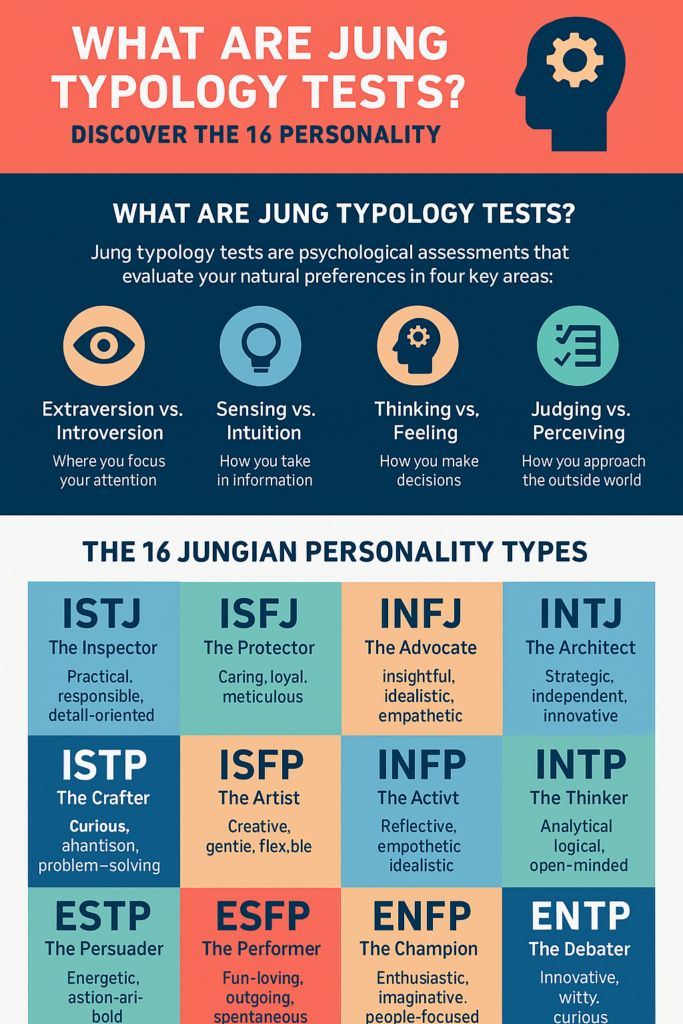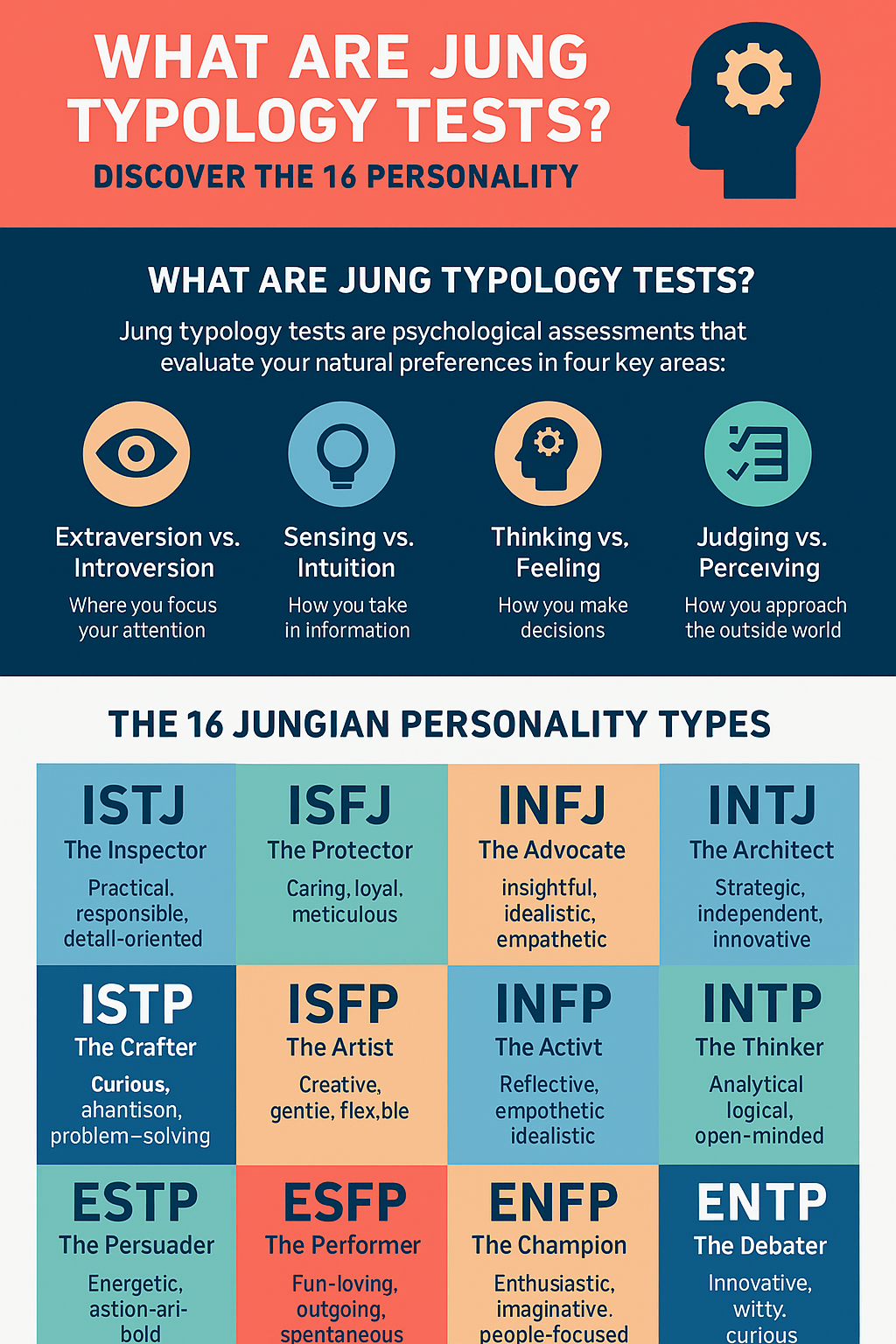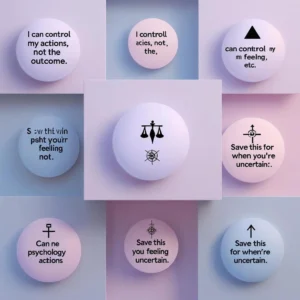Understanding the 16 Personality Types. Jung Typology Tests!
Jung typology is a popular approach to understanding personality, often used in career planning, team building, coaching, and personal development. Many employers use tests based on Jung’s theories to assess behavior and compatibility during the hiring process. Individuals, too, can benefit from these insights to better understand themselves and shape their career paths.
In this article, we’ll explore what Jung typology tests are, break down the 16 personality types they identify, and explain how they can help you both professionally and personally.
What are Jung typology tests?
Jung typology tests are personality assessments rooted in the theories of Swiss psychoanalyst Carl Gustav Jung. These tests measure your psychological preferences in how you interact with others, process information, make decisions, and organize your life. The outcome gives you a clearer understanding of your personality style.
Some well-known assessments based on Jung’s model include:
- Myers-Briggs Type Indicator (MBTI)
- HumanMetrics Jung Typology Test
- TypeFinder Personality Test
- Jung Typology Profiler for the Workplace
These are all self-report questionnaires that ask you to agree or disagree with various statements about your preferences and behaviors. For example: “You find it difficult to talk about your feelings.” You’ll typically answer using a scale of agreement.
After you complete the test, your results highlight your dominant personality traits and often include insights into your:
- Strengths and weaknesses
- Communication and relationship styles
- Workplace behavior and career compatibility
- Friendships and social preferences
What is Jung typology?
Jung typology is a theory of personality that classifies people based on how they perceive the world and make decisions. Carl Jung proposed that behavior is not random but driven by individual preferences in processing information and drawing conclusions.
Jung believed each person leans toward one of two general attitudes:
- Extraversion (E): Draws energy from external interactions
- Introversion (I): Gains energy from solitude and inner thought
He also identified four core psychological functions:
- Sensing (S): Focused on tangible, real-world information—what can be seen, touched, and heard.
- Intuition (N): Oriented toward abstract ideas and patterns, relying on instincts and possibilities.
- Thinking (T): Makes decisions using logic and objective analysis.
- Feeling (F): Makes decisions based on values and emotional connections.
Later, Isabel Briggs Myers added a fourth dimension:
- Judging (J): Prefers structured, planned, and organized lifestyles.
- Perceiving (P): Tends to be flexible, spontaneous, and open to change.
These preferences form the foundation for the 16 personality types we use today.
The 16 Jungian Personality Types
Originally, Jung identified eight basic types, combining introversion or extraversion with one dominant psychological function. Today, with the addition of the Judging vs. Perceiving axis, we recognize 16 personality types—each represented by a four-letter code.
Here’s a breakdown of each type:
1. ESTJ – The Director
Assertive, organized, and practical. They value rules and tradition and are natural leaders.
2. ISTJ – The Inspector
Detail-oriented, responsible, and loyal. They value consistency and work hard to fulfill duties.
3. ENTJ – The Commander
Strategic, confident, and efficient. They enjoy planning and executing big ideas.
4. INTJ – The Architect
Analytical and creative. They are deep thinkers who value logic and innovation.
5. ESTP – The Persuader
Energetic, adaptable, and action-oriented. They thrive in fast-paced environments.
6. ISTP – The Crafter
Independent, practical, and curious. They like to experiment and solve problems hands-on.
7. ENTP – The Debater
Clever, spontaneous, and imaginative. They love exploring new ideas and challenging norms.
8. INTP – The Thinker
Introspective, logical, and inventive. They seek understanding and enjoy theoretical exploration.
9. ESFJ – The Caregiver
Warm, sociable, and loyal. They are tuned into the needs of others and enjoy helping.
10. ISFJ – The Protector
Caring, detail-oriented, and humble. They are reliable and protective of those they love.
11. ENFJ – The Giver
Charismatic, empathetic, and encouraging. They are natural mentors and unify teams.
12. INFJ – The Advocate
Idealistic, insightful, and compassionate. They often work toward meaningful change.
13. ESFP – The Performer
Outgoing, lively, and fun-loving. They enjoy the spotlight and make life exciting.
14. ISFP – The Artist
Quiet, sensitive, and expressive. They have a strong aesthetic sense and seek harmony.
15. ENFP – The Champion
Enthusiastic, creative, and optimistic. They are big-picture thinkers who inspire others.
16. INFP – The Mediator
Thoughtful, empathetic, and idealistic. They are deeply driven by personal values.
How Jung Typology Can Help You
Understanding your Jung typology can give you powerful insights into:
- Career direction: Discover roles that align with your strengths and preferences.
- Communication: Improve how you interact with others—especially those with different types.
- Relationships: Understand what drives your emotional responses and how you connect.
- Personal development: Identify areas to grow and make choices that align with your authentic self.
Whether you’re job hunting, exploring a new career, or simply seeking self-awareness, Jung typology offers a valuable tool for understanding yourself and others.

References:
Discover your personality type















1 comment